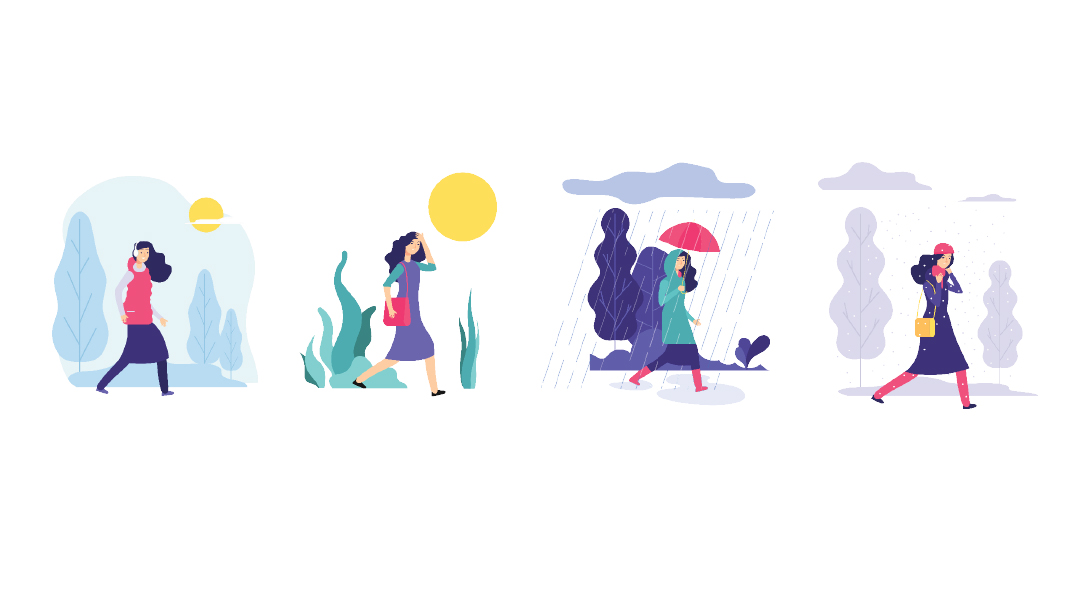Whatever the Weather
| May 6, 2020Weather affects about $3 trillion worth of business in the private sector in the US alone, and impacts mood, productivity, even jury decisions

Clearly soups are going to sell better in the winter and sunscreen will be more popular in the summer, but there are other surprising items that fly off the shelves during specific seasons. Infant clothing sales increase dramatically in warmer weather (four percent for a one-degree increase in temperature) and mousetraps catch customers when it gets colder. During hotter temperature, both in-person and online sales get a boost — including non-weather related products.
Stores are well aware of these outside influences and use seasonal marketing to cater to that period’s popular items. Campbell Soup Co. uses a “misery index” that tracks when the weather takes a nasty turn in US cities and then cues up soup ads in those markets. Pantene’s weather-targeted display ads produced a 28 percent sales increase, and Starbucks uses email promos referencing current weather conditions to draw in customers.
Negative ads tend to get more attention on gloomy days ⸺ the idea that “misery loves company” applies here. Ever wonder why malls are generally too warm? Studies by Kyle B. Murray in 2010 show warm temperatures cause customers to feel “closer” to products, which increases their perception of the products’ value.
According to Tesco (the British version of Walmart), as soon as the weather turns colder hot cocoa and bird feed start flying off the shelves. Root-vegetable consumption increases, but salads are still a thing — especially on a Monday when we’re all feeling guilty about indulging over the weekend!
The personal “feels like” temperature also plays a role. In Glasgow, Scotland they’re still buying ice cream when it’s six degrees colder than the rest of the UK, as they’re accustomed to cooler temperatures year-round.
Rivky Isaacson, owner of House of Kosher gourmet market (HOK) in Northeast Philadelphia, says that in the winter, in addition to the expected hot coffee and teas, there’s also a spike in sales in Dunkin Hines mixes, marshmallows, fried chicken, pizza, and precut vegetables for soups.
Cool Your Brain
According to a study at the Harvard Business School, which looked at the productivity of a bank in Tokyo over the course of two years, employees processed loan applications, something which requires focus, more quickly on rainy days than on clear, sunny ones. They concluded that good weather leads to “cognitive distractions” and recommended the company move to a place with miserable weather!
The Dutch psychologist Evert Van de Vliert speculated that extremes are important: cold stress and heat stress promote creativity. Suggestion: instead of taking a snow day, convince your boss to let you off on a “low productivity day” when the weather is warm.
>More or Less<
-Haircuts > “In the winter, there’s a steady small stream of customers. In the summer it tends to fluctuate, going from super busy (before Pesach) to very quiet days (Sefirah). But overall there’s usually more business during the summer months.” Simi Benjamin, a barber at Mr. Clipper, Lakewood
-Public Transport > Increases in colder temperatures
-Anxiety > cold weather leads to spikes in anxiety
-Voting < rain=smaller turnout
-Diet < cold leads people to reach for carbs
-Empathy > ramps up in extreme weather as our shared suffering brings out our kindness. That said, if there have been several natural disasters, compassion fatigue may set in. (Study by Philip Brown and Jessica Minty)
Oops! We could not locate your form.





